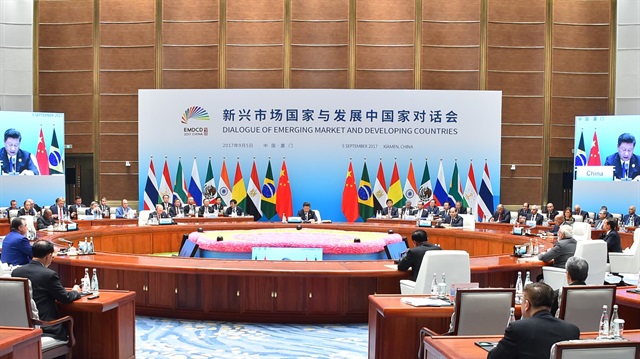
South African envoy highlights Turkey’s ‘exceptional potential’ as Erdogan set to attend BRICS Summit in South Africa
South Africa's envoy to Ankara has highlighted the significance of Turkey’s attendance at the BRICS summit, which would also see the presence of President Recep Tayyip Erdogan.
The BRICS regional bloc is made up of Brazil, Russia, India, China and South Africa, countries that share over 20 percent of the global economy and contribute around 17 percent to international trade.
“In the event that Turkey is invited to join BRICS, it should be expected that the country will positively contribute to the aims and objectives of the formation,” Ambassador Pule I Malefane told Anadolu Agency in an exclusive interview.
Malefane drew attention to Turkey as an “emerging economy”.
“Turkey is also an emerging economy with exceptional potential, therefore, it will correctly improve the profile of the formation and also stand to gain a lot from being a member.
“The bloc presents a specific and systematic attempt at addressing challenges facing the world that range from country-specific problems relating to domestic poverty, inequality and unemployment to climate change and a global economic system that is biased in favor of corporate interests, particularly in finance and technology,” Malefane added.
Erdogan will attend the summit to be held between Wednesday and Friday. His attendance at the summit will serve as the first high-level contact between Turkey and the BRICS bloc.
On the sidelines of the summit, the Turkish president is expected to hold bilateral meetings with the leaders of all BRICS member states and other invited leaders.
A meeting between Russian President Vladimir Putin and Erdogan is scheduled on Thursday on the sidelines of BRICS, according to Russian presidential aide Yury Ushakov.
- 'Turkey, a strategic partner'
Erdogan will later pay an official visit to Zambia on Saturday and meet Zambian President Edgar Lungu to discuss bilateral relations and exchange views on regional and international developments.
Malefane on Erdogan’s attendance said Turkey had been invited to BRICS since the country was being seen as a “strategic partner and leader in the region”.
“Turkey is being regarded as a strategic ally in strengthening south-to-south relations and Agenda 2063, which is a strategic vision of the African Union,” he said.
On Turkey-South Africa relations, South African envoy said the visit is expected to “reemphasize the need to continue on the path of increasing trade between the two countries so as to guarantee a better life for the peoples of the two countries”.
“Turkey remains a historic partner of South Africa dating back to the era of the Ottoman Empire and continues to play an important role in advancing South Africa’s foreign policy and South Africa’s role in the global diplomatic terrain,” he said.
Turkey's trade with BRICS countries was $60.7 billion last year -- $7.3 billion in exports and $53.4 billion in imports, according to Turkey’s statistical authority, TurkStat.
However, regarding the trade volume between Turkey and South Africa specifically, Malefane said: “Our bilateral trade figures are currently just below a billion U.S. dollars and this has exposed the need to dialogue and communicate more to realize the potential that is still untapped.”
Recalling that South Africa was among the first countries to condemn the defeated coup on July 15, 2016, Malefane highlighted that his country will “avail itself to work with Turkey in fighting terrorism within our respective countries and beyond our borders”.
FETO and its U.S.-based leader Fetullah Gulen orchestrated the defeated coup of July 15, 2016, which left 251 people martyred and nearly 2,200 injured.
Ankara also accuses FETO of being behind a long-running campaign to overthrow the state through the infiltration of Turkish institutions, particularly the military, police, and judiciary.
*Sadik Kedir Abdu from Ankara contributed to this story.








